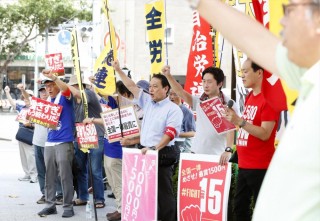Loading
Search
▼ Labor Ministry Panel Suggests Hiking Minimum Wage By ¥27 To Push Japan Average Above ¥900
- Category:Other
A government panel proposed Wednesday that the average hourly minimum wage in Japan should be raised to ¥901 ($8.30) in fiscal 2019, exceeding ¥900 for the first time ever, as the consumption tax will be increased in October.
In its guideline on minimum wages, the labor ministry’s advisory panel said the average wage needs to be raised by ¥27 from the previous year — the largest increase since fiscal 2002, when it started using an hourly wage to propose a rough target for increases.
While minimum wages in Tokyo and Kanagawa Prefecture will exceed ¥1,000 under the proposal, those in 17 prefectures will remain at the ¥700 level, underlining the gap between metropolitan and rural areas.
The Central Minimum Wages Council presented the proposal to labor minister Takumi Nemoto on Wednesday afternoon.
Currently, hourly minimum wages are decided by the ministry’s regional bureaus in each of the country’s 47 prefectures, taking into account local economic conditions.
Following the proposal submitted by the central government’s advisory panel, local panels in each prefecture will recommend revised minimum wages by August. The new minimum hourly wages will be adopted around October.
Although labor unions aiming to boost the income of workers and management seeking to avoid rises in personnel costs clashed in negotiations, the two sides managed to agree on the wage hike, taking into consideration the planned 2 percentage-point tax hike and a labor shortage stemming from the country’s rapidly aging society.
The size of the wage increase was ¥25 in both fiscal 2016 and fiscal 2017, and ¥26 in fiscal 2018. With the proposed hike of ¥27, or 3.1 percent, in fiscal 2019, the average minimum wage will likely post around a 3 percent increase for the fourth consecutive year.
Following marathon talks since Tuesday afternoon that lasted throughout the night, the panel submitted rough targets for minimum wage hikes in four classifications based on the state of the local economy. In Tokyo and five other A-ranked prefectures, the minimum wage would rise by ¥28, while for Kyoto and 10 other prefectures ranked B it would rise by ¥27, and the 30 other prefectures ranked C or D would see a ¥26 rise.
If Tokyo and Kanagawa raise the minimum wage in line with the proposal, the figures will be ¥1,013 and ¥1,011, respectively. It would be the first time for the minimum hourly wage to exceed ¥1,000 in any prefecture.
Though the government has advocated around a 3 percent increase in minimum hourly wages, it adopted a more aggressive expression in its economic and fiscal policy outline compiled in June, saying it aims to have the national average hourly wage “become ¥1,000 sooner” than expected.
If the current pace of wage increases is maintained, the goal of raising the average minimum wage to ¥1,000 will be met around 2023.
Among the 47 prefectures, Kagoshima will offer the lowest minimum wage at ¥787 if the figures are revised as proposed in the guideline.
Wage disparities have been a factor behind the outflow of rural populations, with people migrating to urban areas in search of jobs. This has contributed to a contraction in regional economies.
Meanwhile, a sharp wage hike would hurt the management of small and medium-sized firms. Some experts have said that large increases in the minimum wage would trigger business contractions and bankruptcies, eventually leading to job cuts.
Demanding that the minimum wage be at least ¥800 to help reduce disparities between urban and rural areas, labor unions had called for the minimum wage in Kagoshima — which stood at ¥761 in fiscal 2018 — to be raised by ¥39 in fiscal 2019 to reach the ¥800 mark.
But, business managers, as always, were cautious, citing the average salary hike of 1.3 percent at small companies for fiscal 2019.
People working near the minimum wage line are mostly part-timers and other nonregular workers. The wage hike will help improve their lives, but at the same time will cause heavier financial burdens on employers, analysts said.
- August 1, 2019
- Comment (0)
- Trackback(0)


